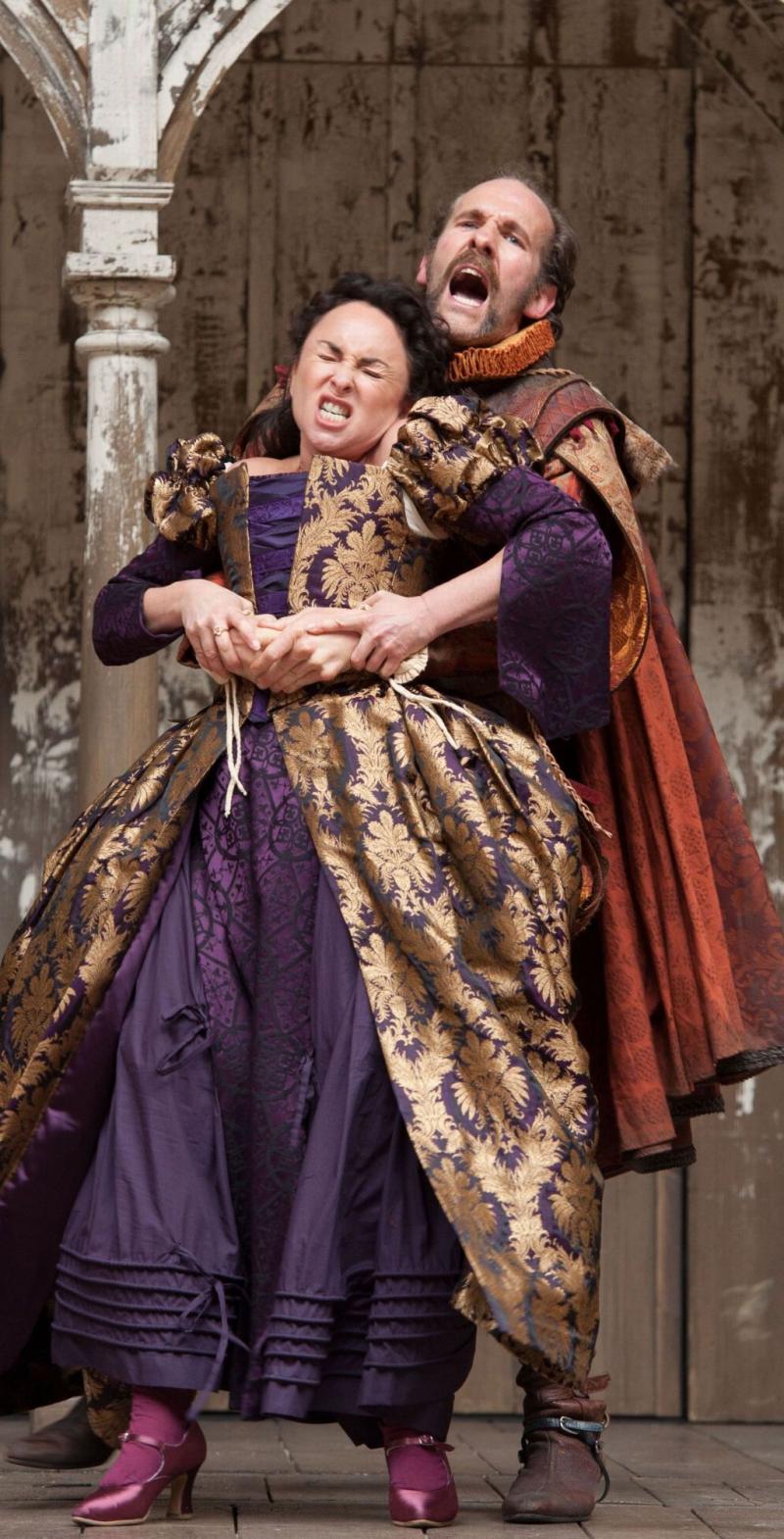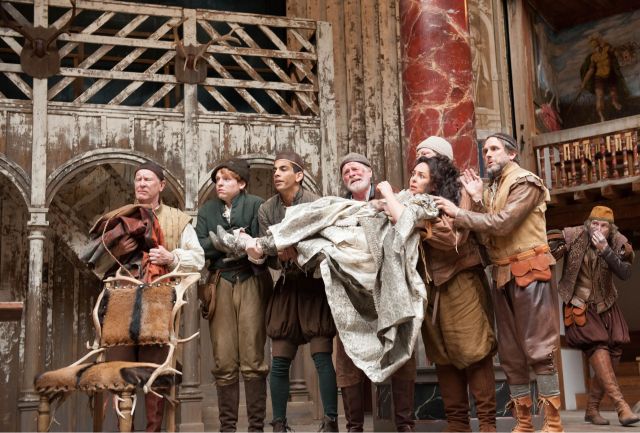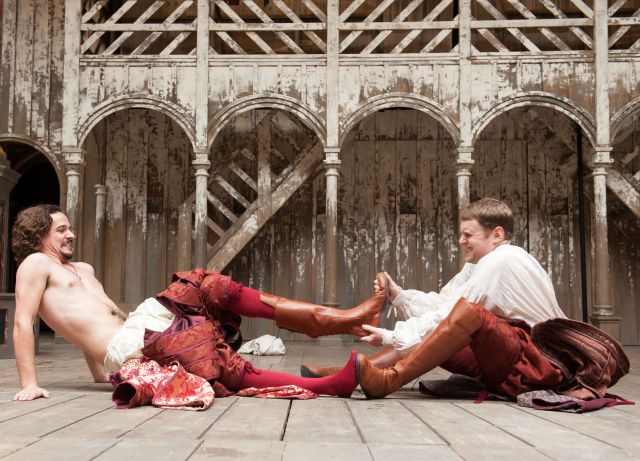The Taming of the Shrew, Shakespeare's Globe | reviews, news & interviews
The Taming of the Shrew, Shakespeare's Globe
The Taming of the Shrew, Shakespeare's Globe
Shakespeare's vexed comedy comes to rude, raucous, and vibrant life

The Taming of the Shrew celebrates its own rumbustious, raucous (mis)behaviour, so why shouldn't Shakespeare's comedy be granted a production that follows suit? From an opening gambit involving bodily fluids sprayed in the direction of the groundlings to a food fight later that would put the bad boys of Posh to shame, Toby Frow's directorial debut at Shakespeare's Globe turns up the volume to consistently giddy effect.
That the staging also finds uncommon delicacy in a play that can seem as "cursed" as its eponymous heroine speaks to the dream team of Samantha Spiro (pictured below, mid-taming) and Simon Paisley Day as the shrewish Katherina, or Kate, and Petruchio, the swaggerer who manages to tame her. A piquant match who throw themselves (sometimes literally) into roles that can look like dry runs for Beatrice and Benedick in Much Ado, these performers look to do for the current Globe repertoire what Eve Best and Charles Edwards accomplished at the same address last year in Shakespeare's later, more mature comedy. When it comes to astute couplings, this is becoming one of the savviest addresses in town.
 Frow's conceptual achievement lies, in fact, in the very lack of the sort of arch, hyper-ironic concept to which Shrew has long been subjected, not least by those determined to make sense of a climactic capitulation from Kate that can be hard going these days. (A darker interpretation has certainly borne fruit: Edward Hall's Propeller company in 2007 turned the play into a sobering study in domestic abuse.) But taking the boisterous high spirits very much on their own terms, Frow and his cast chart the softening of a rebellious presence who might be happier in herself if she would only learn to calm down. For once, Kate's 11th-hour "surrender" reads as a genuine sweetening of the soul, not as some Bardic lesson in how to fashion an Elizabethan-era Stepford Wife.
Frow's conceptual achievement lies, in fact, in the very lack of the sort of arch, hyper-ironic concept to which Shrew has long been subjected, not least by those determined to make sense of a climactic capitulation from Kate that can be hard going these days. (A darker interpretation has certainly borne fruit: Edward Hall's Propeller company in 2007 turned the play into a sobering study in domestic abuse.) But taking the boisterous high spirits very much on their own terms, Frow and his cast chart the softening of a rebellious presence who might be happier in herself if she would only learn to calm down. For once, Kate's 11th-hour "surrender" reads as a genuine sweetening of the soul, not as some Bardic lesson in how to fashion an Elizabethan-era Stepford Wife.
A combatant in life as well as love who isn't above throwing random punches at the groundlings, Spiro's galvanic Kate points up the undoubted psychological effects of forever being found wanting by comparison with a beauteous younger sister, Bianca (Sarah MacRae, very good in a throwaway role), a scenario that is none too likely to find so vilified a sibling scurrying to the altar. Taking in Petruchio at a protracted first glance as if to suggest against the odds that she might actually like what she sees, Kate can no more easily subdue her naturally barbed ways than she can submit to a kiss in public. Affection, one feels, has not often come her way.
 So it emerges as something of a triumph when Kate is able to shed all sense of shame and submit to the longings that have been there from the start. (Among various textual emendations, Frow supplies a voluble if unseen moment of coital excitation.) Somewhat resembling a more compact version of Elizabeth Taylor in the 1967 film of Shrew, Spiro lets you feel the degree to which her gathering peace with herself only amplifies her passion for Petruchio, whom the ever-wonderful Day (a onetime Timon of Athens on this stage) plays like a strict if smitten teacher saddled with an unduly recalcitrant student. Small wonder after the interval that his retinue look eagerly on, keen to see whether the woman whom Petruchio talks of loving is quick enough on the uptake to learn how to respond in keen-wittedly amorous kind. (Short answer: she is.)
So it emerges as something of a triumph when Kate is able to shed all sense of shame and submit to the longings that have been there from the start. (Among various textual emendations, Frow supplies a voluble if unseen moment of coital excitation.) Somewhat resembling a more compact version of Elizabeth Taylor in the 1967 film of Shrew, Spiro lets you feel the degree to which her gathering peace with herself only amplifies her passion for Petruchio, whom the ever-wonderful Day (a onetime Timon of Athens on this stage) plays like a strict if smitten teacher saddled with an unduly recalcitrant student. Small wonder after the interval that his retinue look eagerly on, keen to see whether the woman whom Petruchio talks of loving is quick enough on the uptake to learn how to respond in keen-wittedly amorous kind. (Short answer: she is.)
The staging is rife with business, ranging from Day's willingness to bare (almost) all to an extended aural joke accompanying the oft-repeated reports of Petruchio's dead father. The machinations of the pursuit for Bianca's hand in marriage go on too long as usual, though her suitors are at least enlivened by adroit supporting turns from Joseph Timms (pictured above left, with Jamie Beamish as Tranio) as an amusingly wet Lucentio and Michael Bertenshaw as a fruity, and fun, Gremio; meanwhile, playing Petruchio's lackey, Grumio, a hangdog Pearce Quigley is a dead ringer for Nigel Planer. There will undoubtedly be those for whom the pile-up of antics reaps diminishing returns, but any excesses pale next to the achievement of a production that has accomplished a taming of its own. Not in some while has so potentially sour a play seemed this sweet.
- The Taming of the Shrew plays in repertory at Shakespeare's Globe until 13 October
rating
Explore topics
Share this article
The future of Arts Journalism
You can stop theartsdesk.com closing!
We urgently need financing to survive. Our fundraising drive has thus far raised £49,000 but we need to reach £100,000 or we will be forced to close. Please contribute here: https://gofund.me/c3f6033d
And if you can forward this information to anyone who might assist, we’d be grateful.

Subscribe to theartsdesk.com
Thank you for continuing to read our work on theartsdesk.com. For unlimited access to every article in its entirety, including our archive of more than 15,000 pieces, we're asking for £5 per month or £40 per year. We feel it's a very good deal, and hope you do too.
To take a subscription now simply click here.
And if you're looking for that extra gift for a friend or family member, why not treat them to a theartsdesk.com gift subscription?
more Theatre
 Ragdoll, Jermyn Street Theatre review – compelling and emotionally truthful
Katherine Moar returns with a Patty Hearst-inspired follow up to her debut hit Farm Hall
Ragdoll, Jermyn Street Theatre review – compelling and emotionally truthful
Katherine Moar returns with a Patty Hearst-inspired follow up to her debut hit Farm Hall
 Troilus and Cressida, Globe Theatre review - a 'problem play' with added problems
Raucous and carnivalesque, but also ugly and incomprehensible
Troilus and Cressida, Globe Theatre review - a 'problem play' with added problems
Raucous and carnivalesque, but also ugly and incomprehensible
 Clarkston, Trafalgar Theatre review - two lads on a road to nowhere
Netflix star, Joe Locke, is the selling point of a production that needs one
Clarkston, Trafalgar Theatre review - two lads on a road to nowhere
Netflix star, Joe Locke, is the selling point of a production that needs one
 Ghost Stories, Peacock Theatre review - spirited staging but short on scares
Impressive spectacle saves an ageing show in an unsuitable venue
Ghost Stories, Peacock Theatre review - spirited staging but short on scares
Impressive spectacle saves an ageing show in an unsuitable venue
 Hamlet, National Theatre review - turning tragedy to comedy is no joke
Hiran Abeyeskera’s childlike prince falls flat in a mixed production
Hamlet, National Theatre review - turning tragedy to comedy is no joke
Hiran Abeyeskera’s childlike prince falls flat in a mixed production
 Rohtko, Barbican review - postmodern meditation on fake and authentic art is less than the sum of its parts
Łukasz Twarkowski's production dazzles without illuminating
Rohtko, Barbican review - postmodern meditation on fake and authentic art is less than the sum of its parts
Łukasz Twarkowski's production dazzles without illuminating
 Lee, Park Theatre review - Lee Krasner looks back on her life as an artist
Informative and interesting, the play's format limits its potential
Lee, Park Theatre review - Lee Krasner looks back on her life as an artist
Informative and interesting, the play's format limits its potential
 Measure for Measure, RSC, Stratford review - 'problem play' has no problem with relevance
Shakespeare, in this adaptation, is at his most perceptive
Measure for Measure, RSC, Stratford review - 'problem play' has no problem with relevance
Shakespeare, in this adaptation, is at his most perceptive
 The Importance of Being Earnest, Noël Coward Theatre review - dazzling and delightful queer fest
West End transfer of National Theatre hit stars Stephen Fry and Olly Alexander
The Importance of Being Earnest, Noël Coward Theatre review - dazzling and delightful queer fest
West End transfer of National Theatre hit stars Stephen Fry and Olly Alexander
 Get Down Tonight, Charing Cross Theatre review - glitz and hits from the 70s
If you love the songs of KC and the Sunshine Band, Please Do Go!
Get Down Tonight, Charing Cross Theatre review - glitz and hits from the 70s
If you love the songs of KC and the Sunshine Band, Please Do Go!
 Punch, Apollo Theatre review - powerful play about the strength of redemption
James Graham's play transfixes the audience at every stage
Punch, Apollo Theatre review - powerful play about the strength of redemption
James Graham's play transfixes the audience at every stage
 The Billionaire Inside Your Head, Hampstead Theatre review - a map of a man with OCD
Will Lord's promising debut burdens a fine cast with too much dialogue
The Billionaire Inside Your Head, Hampstead Theatre review - a map of a man with OCD
Will Lord's promising debut burdens a fine cast with too much dialogue

Add comment